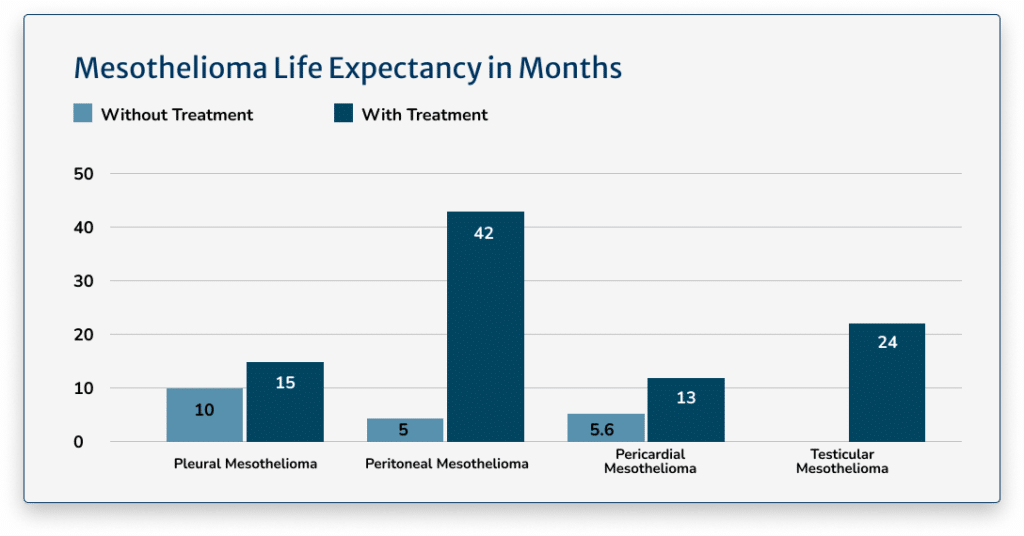Mesothelioma in Seniors
Home » National Mesothelioma Law Firm » Mesothelioma Cancer » Mesothelioma in Seniors

Medically Reviewed By:
Patricia Shelton, M.D.
- Page Last Updated:
- May 29, 2024
Medically Reviewed By:Patricia Shelton, M.D.
- Page Last Updated:
- May 29, 2024
Mesothelioma is an aggressive cancer with a poor prognosis at any age, but mesothelioma in seniors is especially devastating. Senior citizens often have other conditions that worsen the symptoms of mesothelioma, allow it to spread faster, and limit treatment options. Even without comorbidities, an older adult’s immune system may be less able to fight the disease or tolerate treatment. Yet seniors are more likely than any other age group to be diagnosed with mesothelioma.
Why Seniors Are at Risk of Mesothelioma
The primary cause of mesothelioma is asbestos exposure. Seniors have a higher risk of mesothelioma due to the following factors:
- Today’s senior population experienced the most significant asbestos exposure in the workplace.
- Mesothelioma is a latent illness that takes decades to develop.

Occupational Asbestos Exposure by Today’s Senior Citizens
Asbestos was a common component in building materials, industrial applications, and machinery from the 1930s until the late 1970s when the EPA began restricting it. Millions of workers handled asbestos directly on the job while performing manufacturing, building, and maintenance tasks. The military also used asbestos heavily, especially the Navy.
Even after the 1970s, workers and military personnel continued to experience significant asbestos exposure in settings where asbestos had previously been used. While the manufacture of asbestos-containing products had been significantly curtailed, many buildings and components still contained the material. Some workers are still exposed to asbestos today. However, most of the workers who experienced heavy occupational asbestos exposure were those exposed during the period before the EPA began restricting it. Those workers are senior citizens today.
The Latency of Mesothelioma
Mesothelioma is a latent disease that develops over the course of decades. When workers inhale asbestos, the microscopic fibers can become lodged in bodily tissue, causing damage and inflammation for years until mesothelioma develops. The latency of mesothelioma ranges from 10 to 60 years. By the time symptoms emerge, most asbestos-exposure victims have reached their senior years. The average age at diagnosis is 72.
Symptoms of Mesothelioma in Seniors
Most people do not experience immediate symptoms from asbestos exposure. Even after mesothelioma develops, symptoms may not present until the disease reaches an advanced stage. The symptoms that do present are often non-specific ones that mimic other conditions common with aging. Thus, seniors have a heightened risk of a late-stage diagnosis of a serious condition that is already difficult to diagnose.

Physical Mesothelioma Symptoms in Seniors
The physical symptoms vary depending on the type of mesothelioma a patient has. Pleural mesothelioma is cancer of the lining surrounding the lungs. Symptoms may include shortness of breath, chest pain, difficulty swallowing, persistent dry cough, and swelling of the face or arms. Pericardial mesothelioma, cancer of the lining surrounding the heart, has similar symptoms.
Peritoneal mesothelioma is cancer of the lining surrounding the stomach. Early symptoms of peritoneal mesothelioma include nausea, vomiting, diarrhea, abdominal pain, and loss of appetite.
All forms of mesothelioma can lead to weight loss, fatigue, and fever. Weight loss is an especially concerning symptom in seniors, increasing the risk of premature death even without mesothelioma.
The Mental Health Impact of Mesothelioma in Seniors
A patient’s mental health following a mesothelioma diagnosis can impact treatment response and the symptoms’ severity. In many cases, by the time a senior receives a diagnosis, the disease is already advanced, and a noticeable decline in physical and mental function can occur quickly. The sudden news of a dramatically shortened lifespan can understandably bring about a variety of strong emotional responses, such as the following:
- Sadness
- Depression
- Fear of death
- Anxiety
- Helplessness
- Hopelessness
- Suicidal thoughts
Some seniors with mesothelioma feel like a burden when their spouse, grown children, or other loved ones must care for them. These feelings often increase depression and the risk of suicide, particularly in male patients.
Mesothelioma Prognosis for Seniors
Overall, the life expectancy of mesothelioma patients ranges from four to 18 months. The chart below shows the average life expectancies of the types of mesothelioma with and without treatment.

The 42-month life expectancy for peritoneal mesothelioma patients stems from receiving and responding well to a procedure known as CRS-HIPEC, which involves surgically applying chemotherapy to the abdominal cavity. If you are not a candidate for this procedure, the overall life expectancy of peritoneal mesothelioma with chemotherapy treatment is 8.7 to 13.1 months.
- Age at diagnosis
- Stage of mesothelioma at diagnosis
- The existence of other health conditions
- The patient’s overall health
- The patient’s gender
Women with mesothelioma have a longer overall lifespan than men, and this could be due to a younger age at diagnosis. Women who are diagnosed at an older age when they no longer produce estrogen have similar survival rates as men.
Special Considerations for Seniors with Mesothelioma
Chemotherapy can lead to cognitive decline in cancer patients at any age. This effect may be magnified in seniors, particularly if they are already suffering from cognitive decline. Senior adults with preexisting dementia may be unable to make treatment decisions or tell their doctors when they suffer negative side effects from treatment. Cognitively impaired patients are generally excluded from clinical trials, which can provide some mesothelioma patients with hope when other treatment options are unavailable or have failed.
People with dementia may need a power of attorney to designate an agent to make decisions for them. If they did not assign a power of attorney while they were of sound mind, the court may need to appoint a suitable guardian to make treatment and end-of-life planning decisions.

Mesothelioma Treatment Options for Seniors
Seniors with mesothelioma are more likely to have comorbidities that limit treatment options, and they may experience a lower tolerance to treatment due to reduced immune function. They have a greater risk of severe side effects from chemotherapy, and they may be less able to tolerate surgery.
Surgical Options for Seniors with Mesothelioma
Surgical options for mesothelioma are generally only available to patients who are diagnosed with mesothelioma at an early stage before it has spread to the lymph nodes or distant parts of the body. Doctors must also consider the patient’s overall health before offering surgery. Older adults are more likely to have health problems that make them ineligible for surgery, such as the following:
- Heart conditions
- Compromised kidney function
- Reduced liver function
- Lung conditions, such as COPD or emphysema
The two primary surgical procedures for pleural mesothelioma are extrapleural pneumonectomy and pleurectomy/decortication. Extrapleural pneumonectomy involves removing the lung and may be contraindicated for most older adults. However, pleurectomy and decortication, which involves removing the pleural membranes surrounding the lung, is considered safe for adults over 70 without certain surgery risks.
Targeted Treatment
Often used with other treatment approaches, radiation therapy is directed at individual tumors. According to the American Society of Clinical Oncology, older adults tend to tolerate radiation therapy well.
Systemic Therapies in Older Adults with Mesothelioma
Chemotherapy and immunotherapy are systemic treatments offered to patients when the cancer has already spread beyond the initial site. These types of treatments affect the entire body. Seniors are less tolerant of chemotherapy than younger people, resulting in an increased likelihood of side effects, which may include the following:
- Nausea and vomiting
- Nerve damage
- Memory loss
- Reduced white blood cell counts
- Anemia
- Increased risk of infection
Multimodal Treatment
When possible, a mesothelioma doctor may use multimodal therapy, which involves a combination of approaches, such as surgery and chemotherapy. It is important to talk to your doctor about the risks and benefits of each approach to determine what treatments would be the most beneficial to you.
Symptoms Management
Mesothelioma is a terminal illness, and in some cases, curative treatment can impair a patient’s quality of life further. The following therapies can make it easier to cope with symptoms:
- Alternative therapies, such as massage, acupuncture, and biofeedback to manage pain, discomfort, and mental health symptoms
- Mesothelioma drugs to treat pain, shortness of breath, depression, and other symptoms brought on by mesothelioma
Mesothelioma Compensation and Legal Options
Seniors diagnosed with mesothelioma are often retired with a fixed income. Medicare and Medicaid may pay for some treatment, but it may not cover the best options for you. You shouldn’t have to go without the treatment you need because of a lack of financial resources.
The companies that exposed you to asbestos are the ones who should foot the bill. You may be able to access the financial resources you need to cover treatment costs and provide for your family through one or more mesothelioma claims, which may include the following:
- A mesothelioma lawsuit against the manufacturers and distributors that supplied asbestos to your employer
- A wrongful death lawsuit if your loved one died of mesothelioma
- Asbestos trust fund claims
Some companies that exposed people to asbestos went bankrupt. These companies were required to establish asbestos trust funds to compensate victims they exposed. Our experienced mesothelioma lawyers can determine who is responsible for your asbestos exposure and file any lawsuits and asbestos trust fund claims for you. Compensation from these claims can be substantial.
Veterans
If you were exposed to asbestos in the military and subsequently contracted mesothelioma, you may be eligible for veterans’ benefits. VA benefits for people with service-connected mesothelioma include free medical care and monthly disability compensation. You may also be eligible to file a lawsuit against the manufacturers who supplied asbestos to the military.

Providing Care to Seniors with Mesothelioma
It is common for a spouse or adult child to take on the role of caregiver for mesothelioma patients, which can become a full-time job as the disease progresses. Mesothelioma patients may need assistance with the following:
- Daily tasks, such as dressing and bathing
- Emotional support
- Spiritual support
- Assistance with treatment and end-of-life decisions
Professional Caregiving
Meeting all of these needs can become too much for an aging spouse also suffering from health problems, particularly with tasks that require lifting the patient. Several professional care options are available at home or in care facilities to manage medications, monitor symptoms, and modify treatments as needed.
You may be able to receive short-term services through home health or a nursing home. Medicare and Medicaid may cover these options. For long-term care assistance, the following options may be available, depending on your insurance and financial resources:
- In-home care through a private nurse
- Long-term care in a skilled nursing facility
- Hospice care in the home or a facility
Medicare covers hospice care but not long-term skilled nursing care. However, Medicaid may cover it. If you are a veteran, long-term care may be available through the VA, either in a facility or your home.

Schedule a Free Consultation Today
If you or your loved one has been diagnosed with mesothelioma, we can pursue compensation on your behalf so you can access the care you need and get justice against the companies that exposed you to asbestos.
We have won millions of dollars in compensation for asbestos-exposure victims of all ages, and our compassionate mesothelioma lawyers understand the unique challenges seniors and their families face as a result of a mesothelioma diagnosis. Contact us today for a free consultation.
By submitting this form, you agree to our terms & conditions. Please read full disclaimer here.



